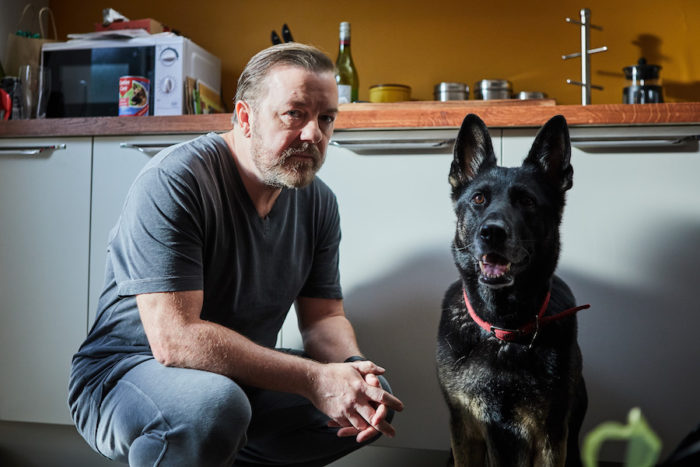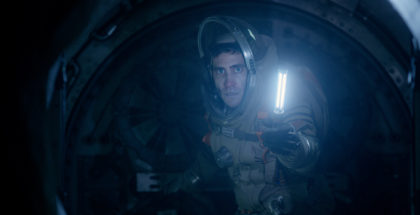Netflix UK TV review: After Life
Review Overview
Cast
9Laughs
7Feels
8David Farnor | On 08, Mar 2019
Read our interview with co-stars Tony Way and Mandeel Dhillon here.
“Humanity’s a plague. We’re a disgusting, narcissistic, selfish parasite, and the world would be a better place without us.” That’s Tony in After Life, Ricky Gervais’ new comedy series. If that doesn’t sound like a laugh-a-minute riot, you’re not wrong, but that’s precisely why the Netflix show is such a disarming success.
Gervais has cultivated for himself a persona of wilful spite and conscious controversy, the kind of figure who seems to enjoy insulting and offending to see how far he can push boundaries. After Life sees him play a man who gives up after his wife, Lisa (Kerry Godliman) dies, and decides to do and say what he wants. It’s a perfect vehicle for Gervais to voice every frustration or tirade he’s ever had, but rather than lean into that temptation, After Life sees Gervais pull back to deliver something smartly restrained; he grounds every outburst and rant in something movingly raw, using each caustic remark not to hurt others but to further explore Tony’s pain.
It’s a delicate balance, not only because that pain is rooted in grief and veers towards suicidal feelings and depression – for anyone who has experienced such thoughts, caution is advised before diving right in – but also because After Life balances all of this with jokes. These come in two varieties: deliberately sarcastic one-liners from Gervais, as he interacts with the staff of the local newspaper where he works, and broadly eccentric locals, who do everything from using breast milk to make rice pudding and spotting celebrities in domestic stains to playing recorders with their noses in an effort to appear on the front page. “Take a photo,” sighs Tony at every increasingly far-fetched lunge for fame, then leads colleague Lenny (Tony Way) off to the next one.
But far from excuse and enjoy Tony’s nastiness, Gervais’ script increasingly calls him out on his behaviour, and explores the consequences of his actions. Saying inappropriate things to kids in the local school playground, even when doing so to defend his nephew, only causes more damage, while his decision to dabble in drugs with a delivery guy fallen on tough times doesn’t end well. Each episode contrasts this with an opening segment of home video, as we see footage of Tony and Lisa before she passed away – a brief glimpse of a different person entirely, and a showcase for Gervais and Godliman’s convincingly tender chemistry.
Godliman does well to stop these sequences becoming overly sentimental, but the rest of the cast get the real heavy lifting to do, as they repeatedly try to rediscover the kind man we’re told used to inhabit Tony’s body – a mission that’s carried out with just enough heart and depth by Way’s slobby photographer, Tom Basden as Lisa’s patient brother, and Mandeep Dhillon as Sandy, the newspaper’s latest idealistic employee. (In between them all, Diane Morgan is brilliant as the office manager who is impossibly, amusingly dull.) Away from the office, David Bradley is wonderfully spiky as Tony’s dad, now in a nursing home, while Ashley Jensen is superb as the sweet yet blunt nurse who clashes with Tony every time he visits. After Life intercuts this ensemble with scenes featuring Penelope Wilton as a widow who frequents the local graveyard, where she dishes out worldly wisdom – and it’s testament to how carefully written, and performed, these one-to-ones are that they far less heavy-handed than they could be.
Because, at its heart, After Life is a programme that gently advocates for kindness and acceptance over overbearing statements or unbridled bullying; it walks a familiar journey of catharsis and recovery, but with just enough withering resentment to stop it becoming twee and just enough sincerity to stop it being mean. “If you could open a tin, I’d be dead by now,” muses Tony to his dog, when nobody’s listening, and it’s in those quiet asides that After Life delivers its emotional blows, as Gervais’ introverted, downbeat presence opens up to something more vulnerable than his persona would normally allow. It’s nothing hugely surprising, but it is something hugely honest; in this modern age of cynical entertainment, the world would be a worse place without it.
After Life is available on Netflix UK, as part of an £9.99 monthly subscription.



















